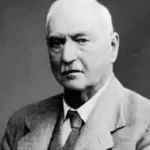 | |
The Case of Oscar Brodski | |
| Author | R. Austin Freeman |
|---|---|
| Published |
1911
|
| Language | English |
| Nationality | British |
| Genre | Humor, Poetry |
1911 Short Story
The Case of Oscar Brodski
The Case of Oscar Brodski is an English Humor, Poetry short story by British writer R. Austin Freeman. It was first published in 1911. The Case of Oscar Brodsky is one of Freeman's inverted detective stories, also referred to as a "locked room mystery" featuring his favorite medical-forensic investigator, Dr. Thorndyke. It was first published in McClure's Magazine, December, 1911.
The Case of Oscar Brodski
by R. Austin Freeman
NO one, looking into Silas Hickler’s cheerful round face, beaming with benevolence and wreathed in perpetual smiles, would have imagined him to be a criminal. Yet it is a fact that Silas earned his modest though comfortable income by the gentle art of burglary. A precarious trade, and risky withal, yet not so very hazardous if pursued with judgment and moderation. And Silas was eminently a man of judgment. He invariably worked alone. He kept his own counsel. Nor was he greedy and thriftless, as most criminals are. His “scoops” were few and far between, carefully planned, secretly executed, and the proceeds judiciously invested in “weekly property.”
Such was Silas Hickler. As he strolled round his garden in the dusk of an October evening, he seemed the very type of modest middle-class prosperity. He was dressed in the traveling suit that he wore on his little Continental trips; his bag was packed and stood in readiness on the sitting-room sofa. A parcel of diamonds (purchased honestly, though without impertinent questions, at Southampton) was in the inside pocket of his waistcoat, and another more valuable parcel was stowed in a cavity in the heel of his right boot. In early life Silas had been connected with the diamond industry, and he still did a little rather irregular dealing. In an hour and a half it would be time for him to set out to catch the boat train at the Junction; meanwhile there was nothing to do but stroll round the fading garden and consider how he should invest the proceeds of the impending deal. His housekeeper had gone over to Weiham for the week’s shopping, and would probably not be back until eleven o’clock.
He was alone on the premises, and just a trifle dull.
He was about to turn into the house, when his ear caught the sound of footsteps on the unmade road that passed the end of the garden. He paused and listened. There was no other dwelling near, and the road led nowhere, fading away into the waste land beyond the house. Could this be a visitor? It seemed unlikely, for visitors were few at Silas Hickler’s house. Meanwhile the footsteps continued to approach, ringing out with increasing loudness on the hard, stony path.
Silas strolled down to the gate, and, leaning on it, looked out with some curiosity. Presently a glow of light showed him the face of a man, apparently lighting his pipe; then a dim figure detached itself from the enveloping gloom, advanced toward him, and halted opposite the garden. The stranger removed a cigarette from his mouth, and asked:
“Can you tell me if this road will take me to Badsham Junction?”
“No,” replied Hickler; “but there is a footpath farther on that leads to the station,”
“Footpath!” growled the stranger. “I’ve had enough of footpaths. I came down from town to Catley, intending to walk across to the Junction. I started along the road, and then some fool directed me to a short cut, with the result that I have been blundering about in the dark for the last half hour. My sight isn’t very good, you know,” he added.
“What train do you want to catch?” asked Hickler.
“Seven fifty-eight,” was the reply.
“I am going to catch that train myself,” said Silas, “but I sha’n’t be starting for another hour. The station is only three quarters of a mile from here. If you would like to come in and take a rest, we can walk down together, and then youll be sure of not missing your way.”
“It’s very good of you,” said the stranger, peering with spectacled eyes at the dark house, “butI think”
“Might as well wait here as at the station,” said Silas in his genial way, holding the gate open; and the stranger, after a momentary hesitation, entered, and, flinging away his cigarette, followed Silas to the door of the cottage.
The sitting-room was in darkness, but, entering before his guest, Silas applied a match to the lamp that hung from the ceiling. As the flame leaped up, flooding the little interior with light, the two men regarded each other with mutual curiosity.
“Brodski, by Jingo!” was Hicklers silent commentary as he looked at his guest. “Doesn’t know me, evidentlywouldn’t, of course, after all these years and with his bad eyesight. Take a seat, sir,” he added aloud. “Will you join me in a little refreshment to while away the time?”
Brodski murmured an indistinct acceptance, and, as his host turned to open a cupboard, he deposited his hat (a hard gray felt) on a chair in a corner, placed his bag on the edge of the table, resting his umbrella against it, and sat down in a small arm-chair.
“Have a biscuit,” said Hickler, as he placed a whisky bottle on the table, together with a couple of his best star-pattern tumblers and a siphon.
“Thanks, I think I will,” said Brodski. “The railway journey and all this confounded tramping about, you know”
“Yes,” agreed Silas. “Doesnt do to start with an empty stomach. Hope you don’t mind oat-cakes; I see they’re the only biscuits I have.”
Brodski hastened to assure him that oat-cakes were his special and peculiar fancy; and, in confirmation, having mixed himself a stiff jorum, he fell to upon the biscuits with evident gusto.
Brodski was a diamond merchant of considerable reputation and in a large way of business. He bought stones principally in the rough, and of these he was a most excellent judge. His fancy was for stones of somewhat unusual size and value, and it was well known to be his custom, when he had accumulated a sufficient stock, to carry them himself to Amsterdam and supervise the cutting of the rough stones. Of this Hickler was aware, and he had no doubt that Brodski was now starting on one of his periodical excursions, and that somewhere in the recesses of his rather shabby clothing was concealed a paper packet worth possibly several thousand pounds.
Brodski sat by the table, munching monotonously and talking little. Hickler sat opposite to him, talking nervously and watching his guest with a growing fascination. Precious stones, and especially diamonds, were Hickler’s specialty; and here was a man sitting opposite him with a parcel in his pocket containing stones worth perhaps Here he pulled himself up short and began to talk rapidly, though without much coherence. For, even as he talked, other words, formed subconsciously, seemed to insinuate themselves into the interstices of the sentences and to carry on a parallel train of thought.
“Gets chilly in the evenings now, doesn’t it?” said Hickler.
“It does indeed,” Brodski agreed, and then resumed his slow munching, breathing audibly through his nose.
“Five thousand at least,” the subconscious train of thought resumed, “probably six or seven, perhaps ten.” Silas fidgeted in his chair and endeavored to concentrate his ideas on some topic of interest. He was growing disagreeably conscious of a new and unfamiliar state of mind.
“Do you take any interest in gardening?” he asked. Next to diamonds and “weekly property,” his besetting weakness was fuchsias.
Brodski chuckled sourly. “Hatton Garden is the nearest approach” He broke off suddenly, and then added: “I am a Londoner, you know.”
The abrupt break in the sentence was not unnoticed by Silas, nor had he any difficulty in interpreting it. A man who carries untold wealth upon his person must needs be wary in his speech.
“Yes,” he answered absently; “it’s hardly a Londoner’s hobby.”
He glanced furtively at his guest across the table, and then looked away quickly, as he felt stirring within him an impulse the nature of which he could not mistake. This must be put an end to.
He had always looked upon crimes against the person as sheer insanity.
Of course, if he had happened to be that sort of person, here was the opportunity of a life-time. The immense booty, the empty house, the solitary neighborhood, away from the main road and other habitations, the time, the darknessbut, of course, there was the body to be thought of; that was always the difficulty. What to do with the bodyhere he caught the shriek of the up express rounding the curve in the line that ran past the waste land at the back of the house. The sound started a new train of thought, and, as he followed it out, his eyes fixed themselves on the unconscious and taciturn Brodski. And ever through his mind walked, like a dreadful procession, the thoughts of what another mana man of blood and violencewould do in these circumstances. Detail by detail, the hideous synthesis fitted together the parts of the imagined crime, and arranged them in due sequence until they formed a succession of events, rational, connected, and coherent.
He rose uneasily from his chair, with his eyes still upon bis guest. He could not sit any longer opp^^e that man with his hidden store of precious gems. The impulse that he recognized with fear and wonder was growing more ungovernable from moment to moment. If he stayed it would presently overpower him, and then He shrank with horror from the dreadful thought, but his fingers itched to handle the diamonds.
But he would make one more effort to escape. He would keep out of Brodski’s actual presence until the moment for starting came.
“If you’ll excuse me,” he said, “I will go and put on a thicker pair of boots. After all this dry weather we may get a change, and damp feet are very uncomfortable when you are traveling.”
“Yes; dangerous, too,” agreed Brodski.
Silas walked into the adjoining kitchen, where, by the light of the little lamp that was burning there, he had seen his stout country boots placed, cleaned and in readiness, and sat down upon a chair to make the change. He did not, of course, intend to wear the country boots, for the diamonds were concealed in those he had on. But he would make the change and then alter his mind; it would all help to pass the time.
He looked up as he slowly unlaced his boot. From where he sat he could see Brodski sitting by the table with his back toward the kitchen door. Suddenly, yielding to an uncontrollable impulse, Silas stood up and began stealthily to creep along the passage to the sitting-room. Not a sound came from his stockinged feet as they trod the stone floor of the passage. Silently as a cat he stole forward, breathing softly with parted lips, until he stood at the threshold of the room. His face flushed duskily, his eyes, wide and staring, glittered in the lamplight, and the racing blood hummed in his ears.
Brodski struck a match,Silas noted that it was a wooden vesta,lighted his cigarette, blew out the match, and flung it into the fender. Then he replaced the box in his pocket and began to smoke.
Slowly and without a sound, Silas crept forward into the room, step by step, with cat-light stealthiness, until he stood close behind Brodski’s chairso close that he had to turn his head that his breath might not stir the hair upon the other man’s head. So for half a minute he stood motionless, like a symbolical statue of Murder, glaring down with horrible, glittering eyes upon the unconscious diamond merchant. And then, as noiselessly as before, he backed away to the door, turned quickly, and walked back into the kitchen.
He drew a deep breath. It had been a near thing. Brodski’s life had hung upon a thread. For it had been so easy! Indeed, if he had happened, as he stood behind the man’s chair, to have a weapona hammer, for instance, or even a stone
He glanced around the kitchen, and his eye lighted on a bar that had been left by workmen who had put up a new greenhouse. It was an odd piece cut off from a square wrought-iron stanchion, and was about a foot long and perhaps three quarters of an inch thick. If he had had that in his hand a minute ago!
He picked the bar up, balanced it in his hand, swung it round his head. A formidable weapon, thissilent, too. Bah! He had better put the thing down.
But he did not. He stepped over to the door and looked again at Brodski, sitting as before, meditatively smoking, with his back toward the kitchen.
Suddenly a change came over Silas. His face flushed, the veins of his neck stood out, and a sullen scowl settled on his face. He drew out his watch, glanced at it earnestly, and replaced it. Then he strode swiftly but silently along the passage into the sitting-room.
A pace away from his victim’s chair, he halted and took deliberate aim. The bar swung aloft, but not without some faint rustle of movement, for Brodski looked round quickly even as the iron whistled through the air. The movement disturbed the murderer’s aim, and the bar glanced off his victim’s head, making only a trifling wound. Brodski sprang up with a tremulous, bleating cry, and clutched his assailant’s arms with the tenacity of mortal terror.
Then began a terrible struggle as the two men, locked in a deadly embrace, swayed to and fro and trampled; backwards and forwards. The chair was overturned, an empty glass swept from the table, and, with Brodski’s spectacles, crushed beneath stamping feet. And thrice that dreadful, pitiful, bleating cry rang out into the night, filling Silas, despite his murderous frenzy, with terror lest some chance wayfarer should hear it. Gathering his great strength for a final effort, he forced his victim backwards on to the table, and, snatching up a corner of the table-cloth, thrust it into his face and crammed it into his mouth as it opened to utter another shriek. And thus they remained for a full two minutes, almost motionless, like some dreadful group of tragic allegory. Then, when the last faint twitchings had died away, Silas relaxed his grasp and let the limp body slip softly to the floor.
It was over. For good or for evil, the thing was done. Silas stood up, breathing heavily, and, as he wiped the sweat from his face, he looked at the clock. The hands stood at one minute to seven. The whole thing had taken a little over three minutes. He had nearly an hour in which to finish his task. The goods train that entered into his scheme came by at twenty minutes past, and it was only three hundred yards to the line. Still, he must not waste time. He was now quite composed, and disturbed only by the thought that Brodski’s cries might have been heard. If no one had heard them, then it was all plain sailing.
He stooped, and, gently disengaging the table-cloth from the dead man’s teeth, began a careful search of his pockets. He was not long in finding what he sought, and, as he pinched the paper packet and felt the little hard bodies grating on one another inside, his faint regrets for what had happened were swallowed up in self-congratulations.
He now set about his task with businesslike briskness and an attentive eye on the clock. A few large drops of blood had fallen on the table-cloth, and there was a small bloody smear on the carpet by the dead man’s head. Silas fetched from the kitchen some water, a nail-brush, and a dry cloth, and, having washed out the stain from the table-cover,not forgetting the deal table-top underneathcleaned away the smear from the carpet, and rubbed the damp places dry, he slipped a sheet of paper under the head of the corpse to prevent further contamination. Then he set the table-cloth straight, stood the chair upright, laid the broken spectacles on the table, and picked up the cigarette, which had been trodden flat in. the struggle, and flung it under the grate. Then there was the broken glass, which he swept up into a dust-pan. Part of it was the remains of the shattered tumbler, and the rest the fragments of the broken spectacles. He turned it out on a sheet of paper and looked it over carefully, picking out the larger recognizable pieces of the spectacle glasses and putting them aside on a separate slip of paper, together with a sprinkling of the minute fragments. The remainder he shot back into the dust-pan, and, having hurriedly put on his boots, carried it out to the rubbish-heap at the back of the house.
It was now time to start. Hastily cutting off a length of string from his string-box, he tied it to the dead man’s bag and umbrella, and slung them from his shoulder. Then he folded the paper of broken glass, and, slipping it and the spectacles into his pocket, picked up the body and threw it over his shoulder. Brodski was a small, spare man, weighing not more than nine stone; not a very formidable burden for a big, athletic man like Silas.
The distance to the line was about three hundred yards. It took him just six minutes to reach the three-bar fence that separated the waste land from the railway. Arrived here, he halted for a moment and once more listened attentively, peering into the darkness on all sides. Not a living creature was to be seen or heard in this desolate spot.
Lifting the corpse over the fence, he stepped down on the loose, chalky soil that bordered the permanent way, and carried it a few yards farther, to a point where the line curved sharply. Here he laid it down, face downwards, with the neck over the near rail. Drawing out his pocket-knife, he cut through the knot that fastened the umbrella to the string and also secured the bag; and, when he had flung the bag and umbrella on the track beside the body, he carefully pocketed the string, excepting the little loop that had fallen to the ground when the knot was cut,
The quick snort and clanking rumble of the approaching goods train was now clearly audible. Silas quickly drew from his pocket the battered spectacles and the packet of broken glass. The former he threw down by the dead man’s head, and then, emptying the packet into his hand, sprinkled the fragments of glass around the spectacles.
He was none too soon. Already the quick, labored puffing of the engine sounded close at hand. Hastily he climbed back over the fence, and strode away across the rough fields, while the train came snorting and clattering toward the curve.
He had nearly reached his back gate when a sound from the line brought him to a sudden halt. It was a prolonged whistle, accompanied by the groan of brakes and the loud clank of colliding trucks. The train had stopped!
For one brief moment Silas stood with bated breath and mouth agape; then he strode forward quickly to the gate, and, letting himself in, silently slid the bolt. He was undeniably alarmed. What could have happened on the line? It was practically certain that the body had been seen, but what was happening now? And would they come to the house? He entered the kitchen, and, walking through to the sitting-room, looked round. Everything seemed in order there. There was the bar, though, lying where he had dropped it in the scuffle. He picked it up and held it under the lamp. There was no blood on it, only one or two hairs. Somewhat absently, he wiped it with the table-cover, and then, running out through the kitchen into the back garden, dropped it over the wall into a bed of nettles. He now felt that it would be well to start for the station. It was not time yet, for it was barely twenty-five minutes past seven; but he did not wish to be found in the house if anybody should come. His soft hat was on the sofa, with his bag, to which his umbrella was strapped. He put on the hat, caught up the bag, and stepped over to the. door; then he came back to turn down the lamp. And it was at this moment, when he stood with his hand raised to the burner, that his eye, traveling by chance into the dim corner of the room, lighted on Brodski’s gray felt hat, reposing on the chair where the dead man had placed it when he entered the house.
Silas stood for a few moments as if petrified, with the chilly sweat of mortal fear standing in beads upon his forehead. Another instant and he would have turned the lamp down and gone on his way, and then He strode over to the chair, snatched up the hat, and looked inside it. Yes, there was the name, “Oscar Brodski,” written plainly on the lining. If he had gone away, leaving it to be discovered, he would have been lost; indeed, even now, if a search-party should come to the house, it was enough to send him to the gallows.
His limbs shook with horror at the thought, but, in spite of his panic, he did not lose his self-possession.
For a few brief moments he stood considering the circumstances with intense concentration. Obviously, the proper thing to do was to burn it. ^ But the fire was out, and there was hardly time to rekindle it. Besides, a hat was not a very inflammable object and might take a long time to burn; and it would never do to leave it imperfectly consumed and perhaps recognizable. No; he would take it with him.
Having arrived at this conclusion, he placed the hat on the floor, and deliberately trod on it again and again until it was as flat as a closed opera-hat. Then he unbuttoned his waistcoat, and, having bestowed the flattened hat inside, rebuttoned his waistcoat and coat.
Then he went out, locked the door, pocketed the key (of which his housekeeper had a duplicate), and set off at a brisk pace for the station.
He arrived in good time, and, having taken his ticket, strolled through on to the platform. The train was not yet signaled, but there seemed to be an unusual stir in the place. The passengers were collected in a group at one end of the platform, and were all looking in one direction down the line; and, even as he walked toward them with a certain tremulous, nauseating curiosity, two men emerged from the darkness, carrying a stretcher covered with a tarpaulin. The passengers parted to let the bearers pass, turning fascinated eyes upon the shape that showed faintly through the rough pall.
PART II
The dusk of an October evening was closing in as Thorndyke and I, the sole occupants of a smoking compartment, found ourselves approaching the little station of Ludham; and as the train slowed down we peered out at the knot of country people who were waiting on the platform. Suddenly Thorndyke exclaimed in a tone of surprise: “Why, that is surely Boscovitch!” And almost, at the same moment a brisk, excitable little man darted at the door of our compartment and literally tumbled in.
“I hope I don’t intrude on this learned conclave,” he said, shaking hands genially, and banging his Gladstone with impulsive violence into the rack; “but I saw your faces at the window, and naturally jumped at the chance of such pleasant companionship.”
“You are very flattering,” said Thorndyke”so flattering that you leave us nothing to say. But what, in the name of fortune, are you doing atwhat’s the name of the place? Ludham?”
“My brother has a little place a mile or so from here, and I have been spending a couple of days with him,” Mr. Boscovitch explained. “I shall change at Badsham Junction and catch the boat train for Amsterdam. But whither are you two bound? I see you have your mysterious little green box up on the hat-rack. Going to unravel some dark and intricate crime?”
“No,” replied Thorndyke. “We are bound for Warmington on a quite prosaic errand.”
“But why the box of magic?” asked Boscovitch, glancing up at the hat-rack.
“I never go away from home without it,” answered Thorndyke. “One never knows what may turn up.”
As Boscovitch still looked up wistfully at the case, Thorndyke good-naturedly lifted it down and unlocked it. As a matter of fact, he was rather proud of his “portable laboratory.”
Boscovitch pored over the case and its contents, fingering the instruments delicately and asking innumerable questions about their uses; indeed, his curiosity was but half appeased when, half an hour later, the train began to slow down.
“By Jove!” he exclaimed, starting up and seizing his bag, “here we are at the Junction already. You change here, too, don’t you?”
“Yes,” replied Thorndyke. “We take the branch train on to Warmington.”
As we stepped out on the platform, we became aware that something unusual was happening or had happened. All the passengers and most of the porters and supernumeraries were gathered at one end of the station, and all were looking intently into the darkness down the line.
“Anything wrong?” asked Mr. Boscovitch, addressing the station inspector.
“Yes, sir,” the official replied. “A man has been run over by the goods train about a mile down the line. The station-master has gone down with a stretcher to bring him in, and I expect that is his lantern that you see coming this way.”
As we stood watching the dancing light grow momentarily brighter, a man came out of the booking-office and joined the group of onlookers. He attracted my attention, as I afterward remembered, for two reasons: in the first place, his round, jolly face was excessively pale and bore a strained and wild expression; and, in the second, though he stared into the darkness with eager curiosity, he asked no questions.
Suddenly two men came into sight, bearing a stretcher covered with a tarpaulin, through which the shape of a human figure was dimly discernible. A porter followed, carrying a hand-bag and umbrella, and the station-master brought up the rear with his lantern.
As the porter passed, Mr. Boscovitch started forward with sudden excitement.
“Is that his umbrella?” he asked.
“Yes, sir,” answered the porter, stopping and holding it out for the speaker’s inspection.
“My God!” ejaculated Boscovitch. Then, turning sharply to Thorndyke, he exclaimed: “That’s Brodski’s umbrella. I could swear to it. You remember Brodski, Dr. Thorndyke?”
Thorndyke nodded, and Boscovitch, turning once more to the porter, said: “I identify that umbrella. It belongs to a gentleman named Brodski. If you look in his hat, you will see his name written in it. He always writes his name in his hat.”
“We haven’t found his hat yet,” said the porter; “but here is the station-master.” He turned to his superior and announced: “This gentleman, sir, has identified the umbrella.”
“Oh,” said the station-master, “you recognize the umbrella, sir, do you? Then perhaps you would step into the lamp-room and see if you tan identify the body.”
Mr. Boscovitch recoiled with a look of alarm. “Is itis hevery much injured?” he asked nervously.
“Well, yes,” was the reply. “You see, the engine and six of the trucks went over him before they could stop the train. Took his head clean off, in fact.”
“Shocking! Shocking!” gasped Boscovitch. “I thinkif you don’t mindI’dI’d rather not. You don’t think it necessary, Doctor, do you?”
“Yes, I do,” replied Thorndyke. “Early identification may be of the first importance.”
“Then I suppose I must,” said Boscovitch; and, with extreme reluctance, he followed the station-master to the lamp-room. In a few minutes he burst out, pale and awe-stricken, and rushed up to Thorndyke.
“It is!” he exclaimed breathlessly. “It’s Brodski. Poor old Brodski! Horrible! Horrible! He was to have met me here and gone on with me to Amsterdam.”
“Had he anymerchandise about him?” Thorndyke asked; and, as he spoke, the stranger whom I had previously noticed edged up closer, as if to catch the reply.
“He had some stones, no doubt,” answered Boscovitch. “His clerk will know, of course. By the way, Doctor, could you watch the case for me? Just to be sure it was really an accident oryou know what.”
“Very well,” said Thorndyke. “I will satisfy myself that there is nothing more than appears, and let you have a report. Will that do?”
“Thank you,” said Boscovitch. “It’s excessively good of you, Doctor. Ah, there comes the train. I hope it won’t inconvenience you to stay and see to this matter.”
“Not in the least,” replied Thorndyke.
As Thorndyke spoke, the stranger, who had kept close to us with the evident purpose of hearing what was said, bestowed on him a very curious and attentive look.
No sooner had the train left the station than Thorndyke sought out the station-master and informed him of the instructions that he had received from Boscovitch.
“Of course,” he added, in conclusion, “we must not move in the matter until the police arrive. I suppose they have been informed.”
“Yes,” replied the station-master; “I sent a message at once to the chief constable. I think I will slip out and see if he is coming.”
He evidently wished to have a word in private with the police officer before committing himself to any statement.
As the official retreated, Thorndyke and I began to pace the now empty platform.
“Why not put a few discreet questions to the porter who brought in the bag and umbrella?” I suggested.
“An excellent suggestion, Jervis,” answered Thorndyke. “Let us see what he has to tell us.”
We approached the porter, and found him bursting to unburden himself of the tragic story.
“The way the thing happened, sir, was this,” he said, in answer to Thorndyke’s question. “There’s a sharpish bend in the road just at that place, and the train was just rounding the curve when the driver suddenly caught sight of something lying across the rails. As the engine turned, the head-lights shone on it, and then he saw it was a man. He shut off steam at once, blew his whistle, and put the brakes down hard; but, as you know, sir, a goods train takes some stopping; before they could bring her up, the engine and half a dozen trucks had gone over the poor beggar.”
“Could the driver see how the man was lying?” Thorndyke asked.
“Yes, he could see him quite plain, because the head-lights were full on him. He was lying on his face, with his neck over the near rail on the down side. His head was in the four-foot way, and his body by the side of the track. It looked as if he had laid himself out a-purpose.”
“Is there a level crossing thereabouts?” asked Thorndyke.
“No, sir; no crossing, no road, no path, no nothing,” said the porter, ruthlessly sacrificing grammar to emphasis. “He must have come across the fields and climbed over the fence to get on to the permanent way. Deliberate suicide is what it looks like.”
Thorndyke thanked the man for his information, and, as we strolled back toward the lamp-room, discussed the bearing of these new facts.
“Our friend is unquestionably right in one respect,” he said. “This was not an accident. The man might, if he were near-sighted, deaf, or stupid, have climbed over the fence and got knocked down by the train. But his position, lying across the rails, can be explained only by one of two hypotheses: either it was, as the porter says, deliberate suicide, or else the man was already dead or insensible. But here comes the station-master, and an officer with him. Let us hear what they have to say.”
The police inspector agreed to allow us to view the body, and we entered the lamp-room together, the station-master leading the way to turn up the gas.
The stretcher stood on the floor by one wall, its grim burden still hidden by the tarpaulin, and the hand-bag and umbrella lay on a large box, together with the battered frame of a pair of spectacles from which the glasses had fallen out.
“Were these spectacles found by the body?” Thorndyke inquired.
“Yes,” replied the station-master. “They were close to the head, and the glass was scattered about on the ballast.”
Thorndyke made a note in his pocket-book, and then, as the inspector moved the tarpaulin, he glanced down on the corpse. For fully a minute he remained silently stooping over the uncanny object; then he stood up and said quietly to me: “I think we can eliminate two out of the three hypotheses.”
The inspector looked at him quickly, and was about to ask a question, when his attention was diverted by the traveling-case which Thorndyke had laid on a shelf and now opened to abstract a couple of pairs of dissecting-forceps. With one pair of forceps he turned back the lip, and, having scrutinized its inner surface, closely examined the teeth.
“May I trouble you for your lens, Jervis?” he said; and, as I handed him my doublet ready opened, the inspector brought the lantern close to the dead face and leaned forward eagerly. In his usual systematic fashion, Thorndyke slowly passed the lens along the whole range of sharp, uneven teeth, and then, bringing it back to the center, examined with more minuteness the upper incisors. At length, very delicately, he picked out with his force







